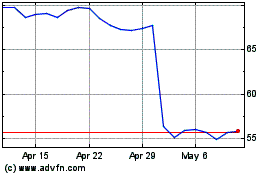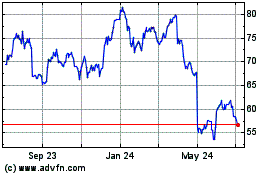By Jeanne Whalen
Many U.S. schools are ramping up campaigns to prevent opioid
abuse among students as evidence mounts of a growing problem.
Some are inviting pharmacists to schools to convey the dangers
of prescription pills. Others are offering emergency counseling via
text message. In some regions, schools are teaching a
substance-abuse-prevention program developed at Cornell University
to students as young as fourth grade.
The widening crisis of addiction to heroin, prescription
painkillers and other opioids "has been very scary, very serious,"
says Michael Lubelfeld, superintendent of an elementary- and
middle-school district in Deerfield, Ill. "We want to do everything
as a community to start addressing it at age 10, 11, 12, so when
they are 23 they aren't going to be addicted."
The rate of U.S. children hospitalized for prescription-opioid
overdoses more than doubled over a 16-year period ending in 2012,
according to a study in JAMA Pediatrics last month. Particularly at
risk were 1- to 4-year-olds, who most likely swallowed their
parents' medications, and older teens who abused the drugs or
attempted suicide, the researchers said.
Hospitalizations for heroin overdoses among teens 15 to 19
nearly tripled over the same period, from 0.96 to 2.51 per 100,000
teens, the study showed.
The roots of the crisis lie in widespread prescribing of
painkillers that created a generation of opioid addicts among
adults and children, public health experts say.
Because opioid addiction often begins with misuse of
prescription painkillers, CVS Health Corp. last year started
sending pharmacists to schools to warn about the dangers. The
pharmacists gave nearly 3,000 presentations in 40 states in the
2015-16 school year.
Kayla Mays, a CVS pharmacist who has given presentations in
Atlanta-area schools, says she rattles off a list of generic and
brand-name prescription painkillers -- Lortab, Norco, OxyContin,
fentanyl and others -- and asks kids to raise their hands if they
have heard of them. "There is a lot of giggling around names like
Percocet or OxyContin," she says, "because those drugs are
mentioned in a lot of pop songs."
But the mood turns serious when Ms. Mays plays a video
describing the downward spiral of four teens who got hooked on
prescription medication, she says. Drug overdoses killed one of the
students and paralyzed another; two others made it into rehab. "The
video really demonstrates this can happen to anybody -- good kids,
athletes, anybody," Ms. Mays says.
CVS this summer paid $3.5 million to settle federal allegations
that 50 of its pharmacies in Massachusetts and New Hampshire filled
forged prescriptions for painkillers and other controlled
substances. The company says it has "implemented enhanced policies"
to help its pharmacists "determine whether a controlled substance
prescription was issued for a legitimate medical purpose."
In the suburbs north of Chicago and east of Los Angeles, some
schools are trying a new texting tool that connects kids to a
counselor within minutes. Kids send their questions anonymously --
the system hides their phone numbers -- and can use the service to
seek help for themselves or a friend, says Andy Duran, executive
director of Linking Efforts Against Drugs, or LEAD, a nonprofit in
Lake Forest, Ill., that developed the tool, called Text a Tip.
Licensed therapists are on-call round the clock to respond. "We
have had kids text at a party and say, 'There are kids using around
me and I don't know what to do.' So we respond and say, 'Can you
distract yourself, can you leave, can you call a friend or adult to
pick you up?'" says Dana Slowinski, who oversees the therapist
team. "Because what we find is, in the moment kids are not thinking
through their options."
More than 100 school districts in Illinois and California are
using Text a Tip. To cover the program's costs, LEAD charges each
district about $7,500 a year for the service, plus a per-student
fee of about 49 cents.
The Jordan Michael Filler Foundation, established by the family
of a young man who died of a heroin overdose in 2014, helped
finance the cost of the texting service for eight schools in
Highland Park and Deerfield, Ill. The foundation also helped fund a
substance-abuse-prevention program, called Botvin LifeSkills
Training, in the schools.
Botvin LifeSkills was developed by Gilbert Botvin, a professor
emeritus at Weill Cornell Medical College in New York. Conducted in
as many as 15 sessions over several weeks, the program teaches kids
the traits they need to resist pressure to abuse substances,
including self-esteem and strong problem-solving and
decision-making skills.
One study in middle-school children in Iowa and Pennsylvania
found that use of the Botvin program "significantly reduced" the
chances of students taking prescription opioids for nonmedical
purposes by grade 12, compared with a control group that didn't
receive the training, according to results published in 2014 in the
journal Preventive Medicine.
Julie Filler, the mother of the young man who died, said it took
a while to convince some of the schools to accept the help. "The
communities don't want to talk about it because they want people to
buy houses here, " she says of drug addiction.
Write to Jeanne Whalen at jeanne.whalen@wsj.com
(END) Dow Jones Newswires
November 11, 2016 16:38 ET (21:38 GMT)
Copyright (c) 2016 Dow Jones & Company, Inc.
CVS Health (NYSE:CVS)
Historical Stock Chart
From Mar 2024 to Apr 2024

CVS Health (NYSE:CVS)
Historical Stock Chart
From Apr 2023 to Apr 2024
